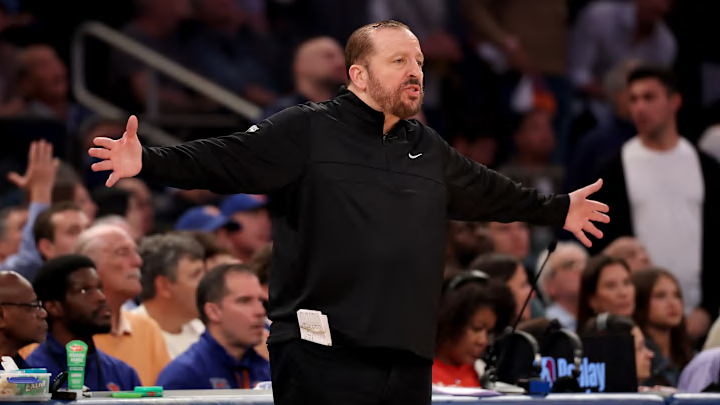When discussing the short rotation that Tom Thibodeau has opted to go with in 2024-25, one must acknowledge the lack of options made available to him by the front office. This isn't to say that Thibodeau's past issues with undervaluing depth should be disregarded, but instead that New York hasn't exactly equipped him with the resources to make an ideal change.
That begins with the simple fact that the Knicks' vaunted trio of wings is backed up by a group that all but exclusively consists of undersized guards and traditional bigs.
Thibodeau has come under fire for another season during which his starters have played a colossal number of minutes. Josh Hart led the NBA in minutes played, while OG Anunoby, Mikal Bridges, Jalen Brunson, and Karl-Anthony Towns all played upward of 35.0 minutes per game.
There were inevitably rational calls for their minutes to be decreased and for a reliable second unit to be built and effectively utilized.
To Thibodeau's credit, he was forced to play 65 games without Mitchell Robinson, 25 without Precious Achiuwa, and 18 without Miles McBride. He also decreased his starters' playing time after Bridges asked him to do so in March.
The unfortunate truth surrounding the act of cutting Anunoby, Bridges, and Hart's minutes, however, is that there isn't an ideal wing on the roster to take their place.
Knicks' lack of wing depth must be acknowledged
New York has an impressive assortment of talented reserves, including Achiuwa, Tyler Kolek, McBride, Cameron Payne, Robinson, and Landry Shamet. It also received quality late-season contributions from trade deadline acquisition Delon Wright.
Throw in second-round draft pick Kevin McCullar Jr. and the untapped potential of 24-year-old MarJon Beauchamp, and the Knicks have a respectable list of bench players.
Achiuwa and Robinson are interior players who operate as traditional bigs, which would offer the first departure from playing Anunoby, Bridges, and Hart as interchangeable wings. Kolek, McBride, Payne, and Shamet, meanwhile, all stand at 6'4" or shorter, and aren't exactly known for consistent defense at the NBA level.
Each of those six players offers something valuable, but the fact remains that Thibodeau doesn't have a single wing who can reliably replace his starters.
That issue speaks to one of the primary reasons New York's second unit never seemed to get off the ground. The best reserves on the roster are relatively redundant when played alongside one another, and given their defensive flaws, don't exactly fit seamlessly alongside Brunson.
McBride, Payne, and Shamet are all in New York to generate offense, while Kolek is a rookie who, while promising, is fighting for minutes at a crowded position.
Wright could've been utilized more given his size and defensive acumen, which is an admittedly fair complaint. In saying that, Thibodeau isn't being asked to just relieve his starters—he's being tasked with creating a championship-caliber bench out of pieces that don't naturally fit together.
Thibodeau will need to find a way around this if the Knicks are going to realize the championship dreams that once seemed far-fetched, but the roster's limitations must be acknowledged when criticizing his choices.
